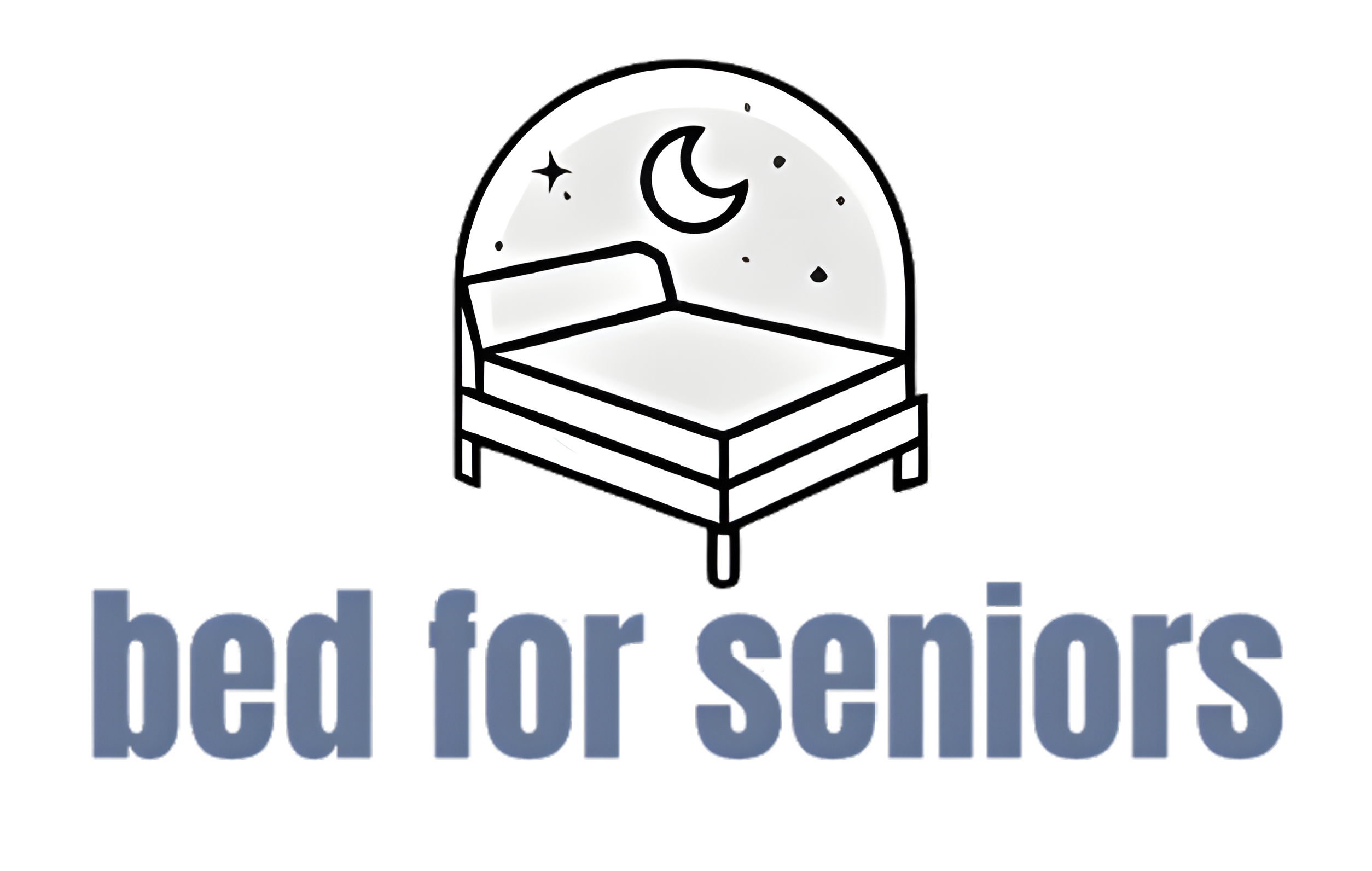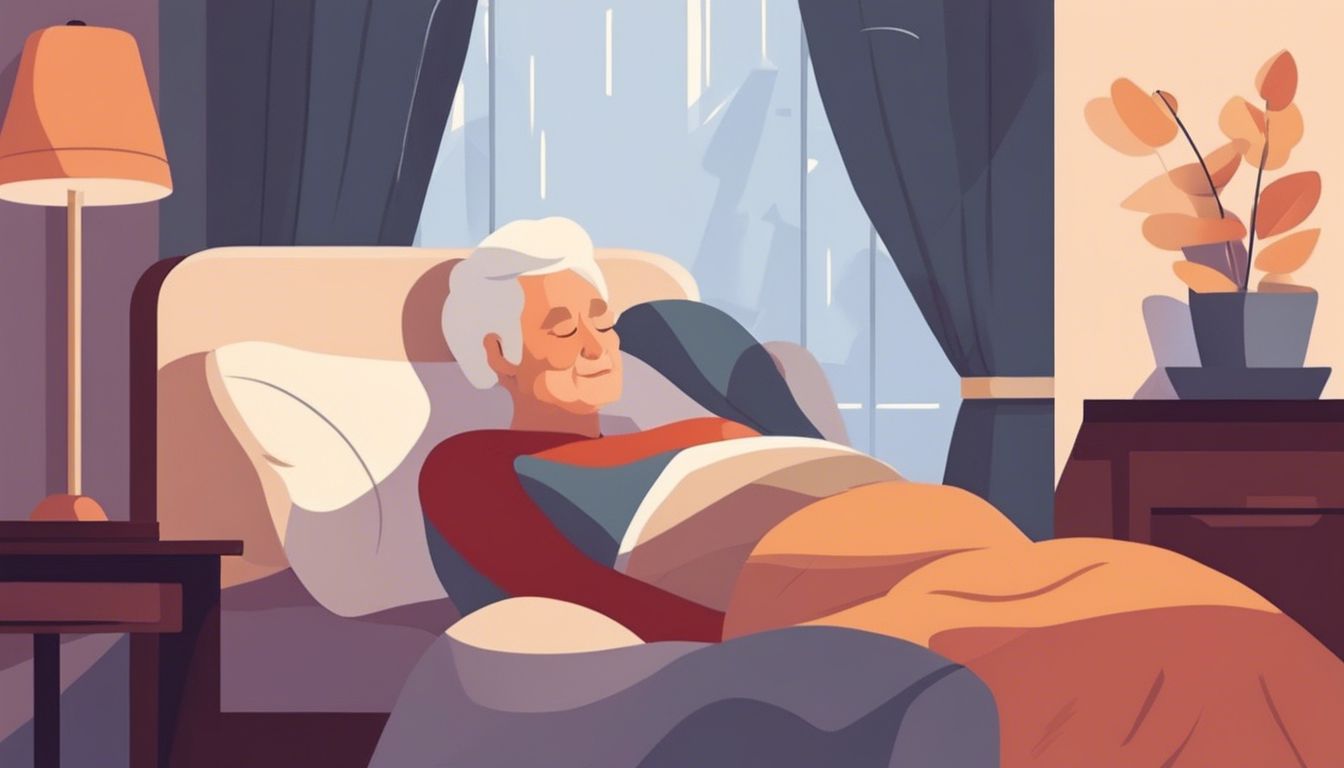Many seniors struggle with memory loss as they age. Sleep plays a crucial role in memory formation and retention. This article explores the connection between sleep and memory in older adults.
We’ll uncover practical tips to improve both.
Sleep quality affects brain function, especially in seniors. Deep sleep helps consolidate memories, but it decreases with age. Improving sleep habits can boost memory and cognitive health.
Let’s examine how sleep impacts memory in older adults.
📋✅
- Sleep quality affects memory in older adults, with deep sleep helping to consolidate memories but decreasing with age.
- REM sleep is crucial for memory retention in seniors, processing emotional memories and linking related information.
- Sleep disorders like sleep apnea can harm memory function, affecting over 900 million people worldwide.
- Implementing SLEEP-SMART tips, such as setting a consistent sleep schedule and creating a relaxing bedtime routine, can improve sleep quality and memory in seniors.
- Natural remedies like herbal teas, essential oils, and melatonin supplements may help enhance sleep quality when used properly under medical guidance.
How Sleep Affects Memory Consolidation

Sleep plays a crucial role in memory consolidation. During sleep, our brains process and store information from the day, turning short-term memories into long-term ones.
Phase 1: Memory Encoding
Memory encoding is the first step in creating lasting memories. During this phase, the brain processes and stores new information it receives from our senses. This initial stage occurs while we’re awake, taking in experiences and learning throughout the day.
For seniors, proper memory encoding becomes crucial as the brain ages. Research shows that non-REM sleep stages prepare the brain for effective learning and memory formation. A well-rested mind is more receptive to new information, making quality sleep essential for older adults aiming to maintain cognitive function.
Sleep before learning prepares the brain for initial formation of memories. – Dr. Matthew Walker
Phase 2: Memory Consolidation
Moving from encoding to consolidation, the brain enters a crucial phase of memory processing. During sleep, especially in the non-rapid eye movement (NREM) stages, the brain sorts through various memories from the previous day.
This sorting helps cement new information into the brain’s architecture, strengthening neural connections and organizing data for long-term storage.
Sleep plays a vital role in this consolidation process, particularly for seniors. The hippocampus, a key brain region for memory, works with the neocortex to transfer and integrate new memories.
Slow-wave sleep, characterized by slow brain waves, is especially important for this transfer. For caregivers, understanding this link between sleep and memory consolidation highlights the importance of ensuring good sleep habits for their elderly loved ones.
Sleep Quality and Memory Function in Aging
Sleep quality changes as we age. Poor sleep affects memory in older adults, leading to forgetfulness and confusion.
The role of REM sleep in memory retention
REM sleep plays a crucial role in memory retention for seniors. During this stage, the brain processes emotional memories and links related information. Research shows that REM sleep helps consolidate episodic memories, which are personal experiences tied to specific times and places.
This process strengthens neural connections, making it easier to recall these memories later.
Seniors often experience changes in sleep architecture, including reduced REM sleep. This can impact their ability to retain new information and access older memories. Studies using electroencephalography (EEG) have found that decreased REM sleep correlates with poorer memory performance in older adults.
Caregivers should prioritize strategies to improve sleep quality, particularly REM sleep, to support cognitive function in aging individuals.
Sleep is the golden chain that ties health and our bodies together. – Thomas Dekker
Sleep disturbances and their impact on memory
Building on the importance of REM sleep for memory retention, it’s crucial to understand how sleep disturbances can negatively impact memory function. Sleep disorders, such as insomnia and sleep apnea, often lead to fragmented sleep patterns and reduced sleep quality.
These disruptions can significantly hinder the brain’s ability to consolidate and store memories effectively.
Sleep apnea, affecting over 900 million people worldwide, poses a particular threat to memory function. This condition causes repeated breathing interruptions during sleep, leading to poor sleep quality and chronic fatigue.
Research has linked sleep apnea to difficulties in memory consolidation, especially for autobiographical memories. Caregivers should be aware that sleep apnea patients may struggle to recall personal life events due to these sleep-related memory impairments.
Addressing sleep disturbances through proper diagnosis and treatment can help improve both sleep quality and memory function in seniors.
Strategies to Improve Sleep and Memory in Seniors
Here are two sentences about “Strategies to Improve Sleep and Memory in Seniors” to lead to further reading:
Seniors can enhance their sleep quality and memory function through simple lifestyle changes. Regular exercise, consistent sleep schedules, and creating a relaxing bedtime routine are effective ways to improve both sleep and cognitive performance.
SLEEP-SMART tips for better sleep hygiene
Sleep hygiene plays a crucial role in maintaining cognitive health for seniors. Caregivers can help their loved ones improve sleep quality and memory function by implementing these SLEEP-SMART tips:
- Set a consistent sleep schedule: Encourage seniors to go to bed and wake up at the same time every day, even on weekends. This helps regulate the body’s internal clock and improve sleep quality.
- Limit naps: While short naps can be beneficial, long or late-day naps may interfere with nighttime sleep. Restrict napping to 20-30 minutes in the early afternoon.
- Exercise regularly: Engage seniors in moderate physical activity during the day to promote better sleep at night. Avoid vigorous exercise close to bedtime.
- Establish a relaxing bedtime routine: Create a calming pre-sleep ritual, such as reading, listening to soft music, or gentle stretching to help seniors wind down.
- Prepare a sleep-friendly environment: Ensure the bedroom is cool, quiet, and dark. Use comfortable bedding and consider blackout curtains or white noise machines if needed.
- Manage light exposure: Encourage exposure to natural daylight during waking hours and limit blue light from electronic devices before bedtime to support the body’s natural sleep-wake cycle.
- Address sleep disorders: Watch for signs of sleep apnea, restless leg syndrome, or other sleep disorders that may require medical attention.
- Review medications: Consult with a healthcare provider about medications that might affect sleep patterns and explore alternatives if necessary.
- Try natural remedies: Consider chamomile tea, lavender aromatherapy, or melatonin supplements under medical guidance to promote relaxation and sleep.
- Monitor caffeine and alcohol intake: Limit consumption of caffeine and alcohol, especially in the evening, as they can disrupt sleep patterns and quality.
Natural Remedies for Better Sleep in Seniors
Building on the SLEEP-SMART tips, we can explore natural remedies to further enhance sleep quality for seniors. These gentle, non-pharmaceutical approaches can complement existing sleep hygiene practices and provide additional support for restful nights.
- Herbal teas: Chamomile, valerian root, and passionflower teas are known for their calming properties. These can be sipped 30-60 minutes before bedtime to promote relaxation.
- Essential oils: Lavender, bergamot, and ylang-ylang oils can be diffused or applied topically (diluted) to create a soothing environment. Their scents may help reduce anxiety and improve sleep quality.
- Melatonin supplements: As melatonin production decreases with age, supplements may help regulate the sleep-wake cycle. Start with a low dose (0.5-1mg) and consult a healthcare provider before use.
- Regular exercise: Engaging in moderate physical activity, especially in the morning or early afternoon, can improve sleep duration and quality. Aim for 30 minutes of daily exercise, such as walking or swimming.
- Relaxation techniques: Deep breathing exercises, progressive muscle relaxation, or guided imagery can help calm the mind and prepare the body for sleep.
- Light therapy: Exposure to bright light during the day can help regulate the circadian rhythm. Spend time outdoors or use a light therapy box to mimic natural sunlight.
- Mindfulness meditation: This practice can reduce stress and anxiety, leading to improved sleep. Even 10-15 minutes of daily meditation can make a difference.
- Magnesium-rich foods: Incorporating foods like nuts, seeds, and leafy greens into the diet can help promote better sleep, as magnesium plays a role in regulating melatonin.
- Warm bath or shower: Taking a warm bath or shower 1-2 hours before bedtime can help lower body temperature and signal the body to prepare for sleep.
- Acupressure: Applying gentle pressure to specific points on the body, such as the inner wrist or between the eyebrows, may help induce relaxation and improve sleep quality.
Sleep plays a crucial role in memory formation and retention for seniors. Research shows that improving sleep quality can enhance cognitive function and slow memory decline. Implementing good sleep hygiene practices, such as maintaining a consistent sleep schedule and creating a relaxing bedtime routine, can make a significant difference.
With proper sleep habits, seniors can support their brain health and potentially reduce the risk of cognitive impairment as they age.
FAQs
1. How does sleep affect memory in older adults?
Sleep plays a big role in memory for seniors. During slow wave sleep, the brain stores long-term memories. Lack of sleep can lead to memory problems and cognitive decline. Good sleep helps prevent brain deterioration as we age.
2. What sleep stages are important for memory?
Two key sleep stages matter for memory: slow wave sleep and rapid eye movement (REM) sleep. Slow wave sleep helps with storing facts and events. REM sleep aids emotional memories. Both stages work together to boost overall memory function.
3. Can poor sleep increase the risk of dementia?
Yes, poor sleep may raise dementia risk. Sleep issues like fragmentation and sleep apnea are linked to mild cognitive impairment and Alzheimer’s disease. Vascular dementia risk also goes up with bad sleep. Getting good sleep could help ward off memory loss.
4. How much sleep do seniors need for good memory?
Most older adults need 7-9 hours of sleep each night. This allows for a full sleep cycle with enough slow wave and REM sleep. Seniors often have trouble sleeping… but sticking to a regular sleep schedule can help maintain memory.
5. What happens in the brain during sleep to boost memory?
During sleep, the brain’s glymphatic system clears out toxins. Hippocampal neurons – key for memory – get activated. The brain also prunes unnecessary connections and strengthens important ones. These processes aid long-term memory storage and recall.
6. Are there ways to improve sleep for better memory?
Yes! Some tips: stick to a sleep schedule, avoid screens before bed, exercise regularly, limit caffeine and alcohol. For serious issues like sleep apnea, see a doctor. Good sleep habits can boost memory and slow cognitive aging in seniors.









